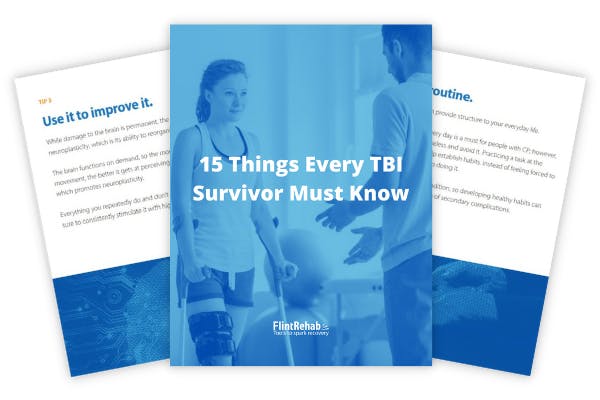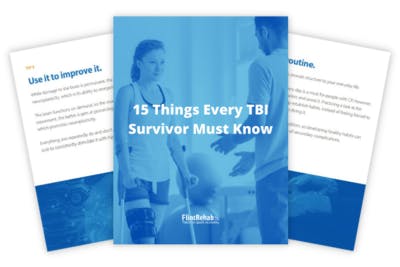No products in the cart.
No products in the cart.
No products in the cart.
No products in the cart.
Home » Neurological Recovery Blog » Traumatic Brain Injury » Aggressive Behavior After Brain Injury: Causes, Triggers, & Coping Mechanisms
Last updated on October 17, 2022

Aggressive behavior after brain injury is often a direct result of damage to the areas of the brain responsible for emotion and behavior, such as the frontal lobe. Understanding behavioral changes that can occur after a head injury is essential to help your loved one manage day-to-day life.
Although managing aggressive behavior can be difficult for both the survivor and their loved ones, it helps to understand that it is usually not within the survivor’s control. Still, it is important for everyone involved to take the necessary safety precautions during aggressive situations.
This article will discuss how a brain injury can cause aggressive behavior and effective coping strategies for both TBI survivors and caregivers.
Use the links below to jump straight to any section.
After a head injury, survivors can experience a variety of secondary effects. Depending on the areas of the brain affected, these effects can be physical, cognitive, and/or behavioral.
One area of the brain that is frequently associated with behavioral changes after TBI is the frontal lobe. The frontal lobe plays a crucial role in reasoning, problem-solving, and impulse control, all of which are necessary for regulating one’s behavior. When the frontal lobe sustains damage, it can impair behavioral skills, leading to aggressive and irrational behavior.
Studies show that 30% of frontal lobe injury survivors experience aggressive behavior. It most commonly appears during the first few weeks after the initial injury, a time period known as the acute phase. According to the Rancho Los Amigos Scale (a popular clinical scale used to measure cognitive recovery after brain injury), aggression can be characterized as a typical part of the recovery process.
In this early stage of recovery, survivors may also experience post-traumatic amnesia or disinhibition. Individuals with post-traumatic amnesia often struggle with memory and exhibit uncharacteristic behaviors. Similarly, individuals with disinhibition lack the ability to control inappropriate behaviors, often leading to risky behavior and poor decision-making after brain injury.
Many survivors are also at risk of entering a temporary state of delirium, where they have minimal to no control over their emotions and behavior. This delirium is often a symptom of frontal lobe damage.
While there are many correlates between frontal lobe injury and aggressive behavior, it’s important to note that damage to other areas of the brain responsible for emotions and behavior, such as the hippocampus, can also cause aggressive behavior after brain injury. In fact, studies have shown that between 11 and 34% of all brain injury survivors display aggressive behaviors at some point during their recovery.
Therefore, even though it may seem as though your loved one is intentionally being aggressive, it’s important to understand that they are often not in control of their actions, especially in the acute phase of an injury.
Aggressive behavior after brain injury can range in severity, from mild to extreme, and should be taken seriously. If you or your loved one are a victim of domestic violence or abuse, it is crucial to take action to protect yourself by calling the domestic abuse hotline in your area. For individuals residing in the United States, you can call 1-800-799-7233.
Aggressive behavior can often be displayed physically or verbally. While it may seem like aggressive behavior is sporadic and sudden, it is usually triggered by emotional or physical discomfort. Survivors of TBI are often experiencing significant changes in their daily lives, and may no longer be able to participate in valued activities. This can be very frustrating, putting a strain on your loved ones’ emotions. When this frustration is combined with other less than ideal circumstances, your loved one may be more predisposed to aggression.
Understanding the triggers of aggressive behavior after brain injury can help you and your loved one find effective management and prevention techniques. Common triggers that can contribute to aggressive behavior after brain injury include:
Individuals may also struggle with the activities of daily living, such as eating and bathing, and may have difficulty asking for help. Identifying and if possible avoiding common triggers is the first step toward overcoming aggressive behavior after brain injury.
As the brain heals, you may start to regain the ability to control your emotions and actions. While this can be challenging, it can be a stepping stone toward recovery. With the proper help and support, you can regain control of your emotions and reduce aggressive behavior.
Here are some coping strategies for TBI survivors that struggle with aggressive behavior:
Over time, as the brain heals, you may be able to regain control of your emotions and reduce outbursts. However, when an injury is severe, coping strategies and therapy may not be enough. In this case, medications such as SSRIs and other antidepressants may be helpful. These can help increase serotonin (the “happy hormone”) in the brain and reduce aggressive behavior.
Studies also show that a dopamine promoting antiviral medication known as amantadine can help individuals reduce aggression after brain injury. Although studies are limited, they show promising results and could be worth talking to your doctor about.
Some survivors struggle with a lack of insight after a brain injury, especially in the early stages of recovery. Lack of insight refers to a cognitive deficit that makes it difficult to examine your own behavior.
As a result, survivors may not recognize irrational behavior or triggers. This can make it challenging for them to engage in effective coping mechanisms for their anger at first. Therefore, it’s important for loved ones to know how to help a survivor during this stage. Friends, family, and caregivers can provide guidance to help their loved one manage their triggers and aggressive behavior after brain injury.
To begin, you can try creating a peaceful and calm environment to help lessen exposure to your loved one’s triggers. This can also help you take better charge of a situation before it escalates. If a sudden outburst occurs, it helps to know what steps to follow to de-escalate the situation.
Here are some helpful tips to defuse an aggressive situation:
If an incident becomes violent, it’s important to always put your safety first. As the survivor relaxes, you can help them understand their behavior. Additionally, as you try to help your loved one cope with aggressive behavior, be sure to take the necessary safety precautions and take time for yourself.
Joining a caregiver support group and ensuring you have some personal self-care time can be vital. While being a caregiver can be rewarding, it may also be incredibly difficult. It is important to give yourself time and space to self-regulate before helping others regulate their emotions and behaviors.
While aggressive behavior after brain injury may seem intentional, it’s important to understand how it is caused and triggered. When the areas of the brain responsible for behavior like the frontal lobe are affected, it can impair behavioral regulation.
Fortunately, there are many effective coping mechanisms survivors can use to manage sudden outbursts and feelings of anger. It’s also important for friends and family to learn strategies to de-escalate aggressive situations while keeping their safety first.
We hope this article helped you and your loved ones understand how aggressive behavior after brain injury can occur, and how you can manage it.

If you like our content, you’ll love our ebook and newsletters! Get instant access to our TBI recovery tips ebook with 20 pages of helpful advice by signing up below.
You’ll also receive our emails that share survivor stories and more useful TBI recovery tips, which you can opt out of at any time. (We know you’ll love them, too.)
We will never sell your email address, and we never spam. That we promise.


Time with a speech therapist is extremely valuable during recovery, especially if you struggle with communication, critical thinking, or memory after brain injury. Insurance typically covers speech therapy for a fixed amount of time. But once it’s over, recovery is in your hands.
That’s why a team of neuroscientists and clinicians from Boston University created the CT Speech & Cognitive Therapy app. Designed for those recovering from stroke, TBI, or living with neurological conditions, the app contains over 100,000 cognitive exercises that are all available right from your phone or tablet. That’s like having a speech therapist by your side whenever you want!
This app is the perfect fit if you want to improve your speaking, memory, or general mental sharpness. And, it’s affordable at just $29.99/month!
“For the past 6 months, my son has used the app about three times a week. The app is like a virtual therapist, it’s very easy to use, and it gives him immediate feedback.
He now understands things faster, can make decisions with less hesitation, has improved recognition of words, and his confidence is higher. I also find it easy to get in touch with customer service; they pleasantly help out. The whole experience has been great.”
— Miriam
With the CT App, you can get the guidance you need right from your phone or tablet. You can use it on your own or in between sessions with your speech therapist.
Whether you struggle with aphasia, memory loss, or critical thinking, the CT Speech & Cognitive Therapy App can help.
“The CT app has helped me gather my confidence by building on and reinforcing old forgotten skills. It helps to see my percentages increase, and work harder when they decrease. It’s very self-motivating.” -Kathryn
We are confident that this app will help improve your speech and cognitive function after brain injury. Like our recovery tools, the CT App is also covered by our 30-day money-back guarantee.

Do you know these 15 TBI recovery tips?
Get a free copy of our ebook 15 Things Every TBI Survivor Must Know. Click here to get instant access.
Grab a free rehab exercise ebook!
Sign up to receive a free PDF ebook with recovery exercises for stroke, traumatic brain injury, or spinal cord injury below: